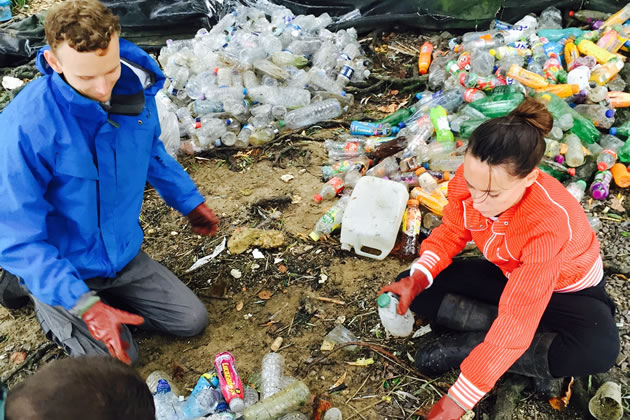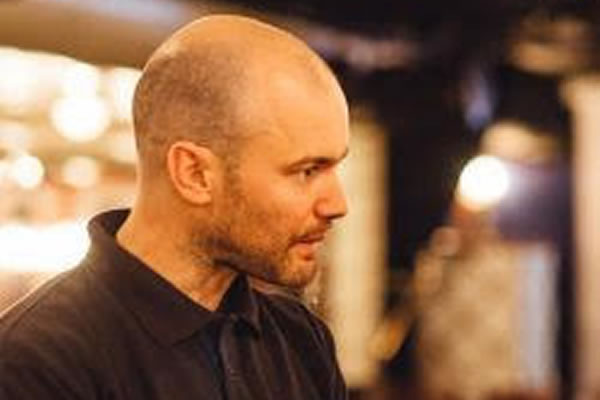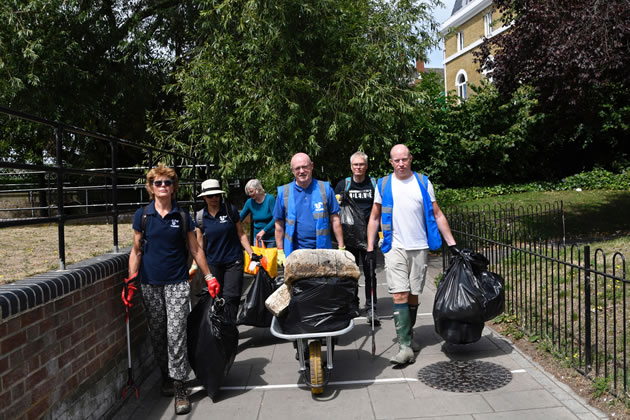Thames Being Hit By 'Plastic Pandemic'
Number of discarded coffee cups in river doubles during lockdown

Almost 600 plastic bottles were collected at Crabtree Wharf Big Bottle Count 2016. Picture: Thames21
|
A lot has been written about how air quality has improved over lockdown, as people haven't been using their cars as much to get around.
But that doesn't mean the pandemic has been good for the environment across the board.
More single-use plastics are being used by takeaways now to try and stop the spread of coronavirus when serving food and drinks.
This is causing a “massive issue” in the Thames, when people don't put them in the bin.
AJ McConville, coordinator of Thames21's plastic monitoring programme, says, “More than 1,600 cups were recovered in three months, just from clean-ups in West London.
“That was twice as many as the same period the year before. That's really significant because the pubs had been closed for quite a long time before then, they only started to reopen in July and they went straight into using single-use again.”
He describes the situation as “disheartening”.
“We have a plastic pandemic. It's easy to become a little bit resigned, which is not a good idea. But it is frustrating,” he says.
Before Christmas the charity's staff walked a kilometre of foreshore and found an average of 322 pieces of plastic per 100m surveyed.
This also included Covid-related PPE, such as discarded gloves and masks, which were found at about 70 per cent of the stretches, averaging about six items per 100 metres.
In the current lockdown, the bigger issue has been around takeaway coffee cups people have been drinking from while walking along the Thames path.
Bins can fill up very quickly and cause the problem of 'careful littering' where people leave their cups stacked up against the bin when it is overflowing.
“It's still littering,” says AJ. “It's still exactly the same crime.
“That's been the big issue. Just in one day, walking from Barnes to Hammersmith Bridge, they found 500 coffee cups on the towpath just in the space of an hour.”

AJ McConville, coordinator of Thames21's plastic monitoring programme. Picture: Thames21
AJ stresses that discarded coffee cups and plastic bottles can easily get blown into the Thames, where they are broken into microplastics that can cause lots of damage to wildlife.
“The Thames is really brimming with life. Now 125 different species of fish have been recorded there. We get seals, porpoises, dolphins, and even seahorses were discovered about 10 years ago
“It's important for people to know that there have been big improvements with water quality in the Thames and wildlife has returned. But plastic is one of these growing issues. It's one of these trends that is pointing in the wrong direction,” he said.
“There are three main ways that plastics can impact on wildlife in general.
“For big plastics, animals might get tangled up in it, so that's things like your seals and dolphins and turtles. That's physically getting trapped in plastic, and that's a big issue. Then there's swallowing and the effect on their digestive system, and then the third one is chemical pollution.”
This is where wildlife from the tiniest sea creatures to the largest whales eat microplastics which then do not get digested, and could have an impact on the food chain and therefore affect humans.
“The whole question about the impact on humans of plastic in the food chain is still quite a huge unknown,” says AJ.
“But we know it has an impact on wildlife because we know that it affects their digestive system and it can prevent them from digesting food properly.”
 Hammersmith Hub, July 2020, Queen Caroline Drawdock. (L to R) Kathy Stevenson, Robyn Leader, Hilary Thomson, Michael Byrne, Sam Morland, James Neish.
Hammersmith Hub, July 2020, Queen Caroline Drawdock. (L to R) Kathy Stevenson, Robyn Leader, Hilary Thomson, Michael Byrne, Sam Morland, James Neish.
Other issues include a 'plastic soup' which can cover saltmarsh in the Thames.
This is the area between land and open water that is regularly flooded by the tides, which has lots of nutrients that are used by small fish.
“These are getting absolutely inundated with plastic and the plastics are getting smaller and smaller and getting churned up into a sort of soup,” says AJ.
“It gets smeared over the top of them. It's hard to know what the impact is, there's some evidence that it's suppressing growth because it's blocking sunlight effectively. These are really valuable habitats which we've got very few of in the Thames really.”
Wet wipes are yet another issue.
“Where you would normally get clams and other molluscs where they can cling on to something or they can burrow into the mud, we're not finding them on the sites where you get the wet wipe mounds, they are becoming unpalatable for molluscs,” he says.
Volunteer groups such as Barnes Tidy Towpath have been working tirelessly to clean up bottles and put up stickers reminding visitors to put their rubbish in the bin or take it home with them.
Richmond and Wandsworth councils have also been working with the charity to prevent littering.
Richmond, for example, recently added extra bins along the towpath, while Wandsworth has increased bin emptying to four times a day on the Putney Embankment. But people are still littering.
“It's not an easy one to resolve,” said AJ.
He now wants to see more local business improvement districts, councils and volunteers working together to sort out the problems with single-use plastics, particularly while people are still extra cautious due to coronavirus.
“We don't want to roll back. We were making good progress and we want to go back to making that progress again,” he says.
He cites the example of the Boston Tea Party Cafe chain, which banned single-use coffee cups in 2018. It has since been offering best practice guidelines on how to serve customers coffee in reusable cups during coronavirus.
“It can be done,” says AJ.
Other things people can do at home include buying filters for their washing machines to reduce the amount of plastic fragments in clothes that get released into the waste treatment system.
He also pleads with people not to put their wet wipes down the loo, and says the simplest thing is to simply buy less plastic where possible, avoiding things that are single-use and giving back unnecessary plastic.
If you're interested in helping to clean up your section of the Thames, you can get in touch with Thames21 at thamesriverwatch@thames21.org.uk, follow them on Twitter @Thames21 or visit their website where you can read their latest plastic pollution report.
Sian Bayley - Local Democracy Reporter
March 3, 2021